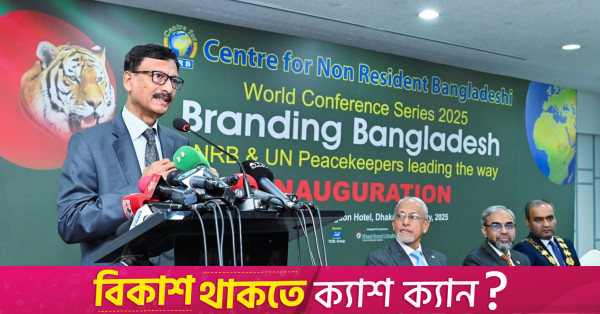He shares how divisions under political banners hurt Bangladesh’s image abroad
Foreign Affairs Adviser Md Touhid Hossain speaks at an event in the capital on 11 January 2025. Photo: UNB
“>

Foreign Affairs Adviser Md Touhid Hossain speaks at an event in the capital on 11 January 2025. Photo: UNB
Noting some of the expatriates’ active opposition or hostility towards each other in the name of political affiliations abroad, Foreign Affairs Adviser Md Touhid Hossain has encouraged the non-resident Bangladeshis (NRBs) to engage in the domestic politics of their respective host country abroad instead of getting involved in Bangladesh’s domestic politics.
Speaking at a NRBs’ conference today (11 January), he said this changed approach will truly help enhance Bangladesh’s image and branding abroad with greater influence like the Indian expatriates who have the leverage with their greater engagement in host countries’ domestic politics through important posts.
“We must come out from this practice,” Hossain said, referring to what has been seen in the past decades abroad under the banner of political parties like Bangladesh Awami League, BNP, Jamaat and Jatiya Party to some extent, not just now or during the previous regime.
The Centre for Non-Resident Bangladeshis (CNRB) hosted the conference titled “Branding Bangladesh: NRB and UN Peacekeepers Leading the Way” as part of world conference series 2025. It was chaired by CNRB Chairperson MS Shekil Chowdhury.
Bangladesh Bank Governor Dr Ahsan H Mansur, among others, spoke at the event.
The foreign adviser also referred to branches of Bangladesh’s major political parties abroad who gather in a big way when someone goes to a particular country from Bangladesh, and posed a question of whether similar things are seen from any other country in the world.
Hossain said they simply see party or individual-based reaction instead of issue-based reaction from some of the Bangladeshi expatriates. “This is harming us in a big way in terms of our image and branding abroad,” he said, encouraging all to look at India and how they are dealing with the issue.

“We will get benefitted when we get involved in domestic politics (of host countries). This is our path, if we want to be influential globally,” he said.
Sharing his experience in serving as Bangladesh Ambassador to South Africa, Hossain said fortunately he saw both BNP and Awami League supporters together welcomed whenever any guest visited the country from Bangladesh.
“It was entirely exceptional,” he said, adding that he did not see such unity by the Bangladeshis in the Western countries which are supposed to be stronger in democratic practice.
Hossain said when NRBs hold important positions in their host countries; it will create a strong brand image for Bangladesh globally.
Referring to the example set by the Indian diaspora, he said Indians have achieved significant global influence by securing crucial positions in governments and political bodies in different countries, especially in Western nations.
Touhid said Bangladesh’s political parties are among the largest in the world, with widespread branches across numerous countries.
“Have you seen people from any other country gathering at airports in foreign lands to chant slogans against someone?” he posed a question.
“Why do Indians enjoy various benefits abroad while we do not? Because we are less involved in local politics,” he added.
The foreign adviser urged NRBs to counter false propaganda against Bangladesh in the international arena especially in Indian media, particularly narratives suggesting a war-like situation or minority-targeted violence in the country.
“Some incidents have occurred, but they were not aimed at minorities due to their religious identity,” he said. “For example, if ten houses were attacked, eight of them were owned by Muslims.”
He called on expatriates to actively combat misinformation and disinformation about Bangladesh.
Hossain also stressed the importance of reducing migration costs and improving the skills of Bangladeshi workers, including language proficiency. “We can double our remittance volume, if we make our workforce more skilled.”
He assured that the interim government is committed to addressing issues at Hazrat Shahjalal International Airport (HSIA), including harassment of passengers. “We are determined to bring those responsible for such harassment to justice.”
Hossain praised Bangladeshi UN peacekeepers for their significant contributions to enhancing the country’s image globally.
“We need to enhance our positive image. Our peacekeepers have built a strong image for us in Africa. These are positive images. On the other hand, when we cross the Mediterranean Sea (illegal migration), our image is tarnished,” he said.
Speaker of London’s Tower Hamlets Barrister Saif Uddin Khaled said that NRBs in the United Kingdom (UK) are always by the side of the Bangladesh people. “We have a debt of blood to Bangladesh. When harm befalls in Bangladesh, we roar in London. When you are hurt, we feel the pain. Your sorrow moves our hearts.”
President of the Bankers’ Association Abdul Hai Sarkar expressed concern over the frequent disputes and conflicts involving expatriates abroad, calling it an unfortunate situation that needs to be addressed.
He also emphasised the importance of improving the skills of Bangladeshi workers.
Former Commander of the UN Peacekeeping Force, Major General (retd) Fazle Elahi Akbar highlighted the army’s vital role in enhancing Bangladesh’s global image, attributing this to their discipline and clean record.


